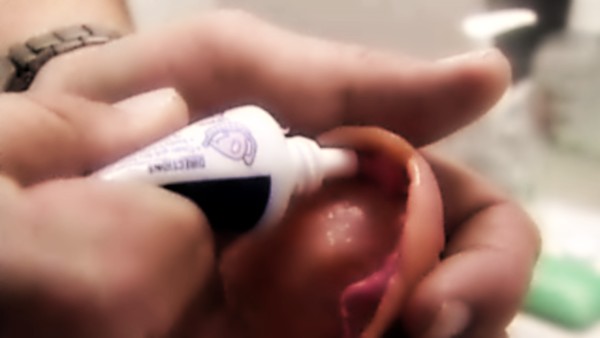Based on a hunch and tips, News 8 medical reporter Janet St. James started investigating poisoning from denture paste, a product used by an estimated 10 million Americans.
At first, manufacturers denied their product posed any risk, despite the evidence presented in a series of News 8 reports.
Now after four years and dozens of stories the maker of the worlds' most popular denture adhesive has changed its tune, saying it will quit making the product because of serious health concerns.
Felt like an electric current going down my back. Then it started working down my leg. It's like my legs right now are topically numb.
That's how J.D. Jackson describes a nerve disorder called neuropathy that caused pain and misery every day. After months of medical detective work, doctors found a surprising cause.
It was literally zinc poisoning, said cancer specialist Dr. Vikas Bhushnan.
Medical experts discovered toxic levels of zinc in Super Poligrip, the denture paste Jackson had used daily for years.
When News 8 first told J.D. Jackson's story in 2006, most medical experts believed his case was isolated. After our report, hundreds of denture wearers contacted News 8, saying they, too, had unexplained neuropathy.
The problem with my feet is, they're almost totally dead, said denture wearer Gerald Elliott. I can't hardly feel.
Elliott was also diagnosed with zinc poisoning after showing a doctor our first report and demanding to be tested.
He, too, used Super Poligrip.
Denture adhesives are classified by the FDA as Class 1 medical devices, meaning they're considered the least risky. The FDA did not require ingredient labels for the product category.
After filing freedom of information requests, News 8 learned both Super Poligrip and Fixodent contain zinc. The mineral is used as an odor blocker and bonding agent.
Both manufacturers repeatedly denied their products posed any risk, saying denture adhesive is safe to use as directed.
Experts we interviewed weren't convinced that the problems reported by users of the product could be caused by something else.
A really good, thorough, well-controlled study needs to be done to rule it in or out, said dentist Dr. Charles Wakefield.
Michael Neerman, an investigator at the North Texas Poison Control center, published an article in a small trade publication called LabMedicine. He had independently diagnosed an unexplained illness in a long-time denture wearer as zinc poisoning.
Neerman suspected the problem might be widespread. I think a lot of people have it and they're not even aware of it, he said. If they do have the symptoms, maybe they don't have sufficient insurance to go in and have it tested.
Then, a study printed in the respected medical journal Neurololgy linked neuropathy in three patients to zinc overload from denture paste. That study was done in Dallas.
An estimated 35 million people use denture creams. Most who need them have poorly-fitting false teeth, like Sherry Mosley.
I really believe that there are a lot of people; poor people that haven't been able to have dentures every three years, like they suggest, she said. All you can do is use this stuff and then later find out that this stuff has caused so many problems, and it's just not right.
Because of a surge in complaints, the makers of Super Poligrip and Fixodent voluntarily updated their product labeling, even providing lengthy question-and-answer sections about zinc on their Web sites.
But there were still no warnings about a potential for zinc poisoning.
So 41-year-old Tammy Baugh used the products without worry. Today, she is nearly crippled.
If it would have been caught early, I sincerely think it wouldn't have got this bad, she said.
Baugh is now one of hundreds of denture wearers to sue.
The family of Norma Howard is filing a wrongful death lawsuit, claiming denture paste poisoning killed her.
A lot of my clients were complaining of symptoms and go to their doctors, and the doctors will simply ignore them; they are unaware of the zinc poisoning issues. They are unaware that these products even contain zinc, said Andy Alonso, part of a team of attorneys representing more than 100 plaintiffs in a mass tort. He credits News 8 reports for getting the word out.
Amid growing pressure and lawsuits, GlaxoSmithKline, the maker of Super Poligrip, announced in February it was reformulating the product without zinc as an ingredient.
Glaxo acknowledged that their popular products could increase the risk of zinc poisoning, neuropathy and other neurological injuries in a company statement:
We are taking these actions because we have become aware of potential health problems associated with the long-term excessive use of our zinc-containing denture adhesive products.
The company sold more than $520 million in denture adhesive last year alone. In Japan, the product was deemed dangerous enough to issue a recall.
GSK has posted a video online, showing users how to properly apply the product so they don't swallow potentially dangerous amounts. The company now admits consumers with poorly-fitting false teeth often use too much, too often, swallowing the excess cream that oozes out.
Procter and Gamble continues to sell Fixodent made with zinc, maintaining the product is safe to use as directed. But the FDA is now considering whether to reclassify denture adhesives as a whole, since the products clearly can be absorbed by the body.
Still, many people tell us they can't convince their doctors of the potential danger.
I asked for the zinc test, and she told me like I told you, 'It's ridiculous.' She said it was a waste of money and time to do the zinc test, said denture-wearer Rachel King, who doesn't have the money to pay for a test without a doctor's order.
Tammy Baugh is angry the company didn't warn consumers years ago. I was mad that they didn't put anything on their boxes or labels to say that this could happen, she said.
Baugh and others who are suffering are still trying to get the word out that some denture adhesives do more harm than good.
E-mail jstjames@wfaa.com


